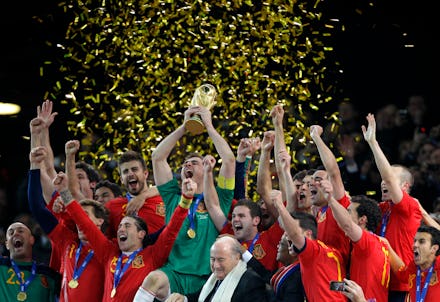Spain Normally Dominates the World Cup. That's Why They Should Bow Out Now

On Friday, you should cheer on the Netherlands. Next Wednesday, root for Chile. Five days later, grab a pie and a beer and support the Australians. That's right, the best thing for this World Cup is for Spain — the current champions and the winners of three consecutive major tournaments — to go out at the earliest opportunity.
Excessive dominance by one team is not good for a sport. This is especially true of soccer, which derives much of its appeal from its relative unpredictability and its status as the game where the weak can triumph over the strong most often. It's been more than half a century since Brazil won the 1962 World Cup to become the last side to retain the trophy, and only twice in the past 12 tournaments has a defending champion made it to the following final.
This Spain team, however, has possibly the best chance of any since the '62 Brazilians to win two in a row. The only issue is whether it would be fun to watch them do so.
The problem is that the possession-based game that helped coach Vicente Del Bosque's dominate South Africa 2010 and the last two European Championships isn't particularly entertaining unless Spain is ripping another side apart, like the 4-0 Euro 2012 final win over Italy in Kiev. The team, controlled by a midfield three of Barcelona's Xavi and Sergio Busquets alongside Xabi Alonso of Real Madrid, is all about keeping the ball. In 2008, it averaged 56.6% possession for the tournament, which lept to 65.2% in the following World Cup. Spain then had 68.2% of the ball in its five games before the final two years ago, before a more open game caused the figure to fall to 60% — still higher than anyone else.
Image Credit: AP
The problem with this is less with the possession itself — it's incredibly difficult to play at this kind of level, and Spain's squad is filled with the kind of technical, quick, super-fit players that other countries can only dream of — but the way it forces other teams to play. The opposition can either try to attack, leave itself exposed to vastly superior players and likely lose or sit deep, make it difficult for Spain and hope to grab and occasional goal-scoring opportunities on the counter-attack.
This second route is far more sensible, but it does mean that much of the game consists of Spain passing patiently and waiting to make a breakthrough. This isn't much fun for the neutral fan watching at home. In 2010, Spain won all its knockout games, from the round of 16 to the final, 1-0. These games weren't much fun to watch and it's difficult, four years on, to remember a single notable thing about them until Andres Iniesta's extra-time goal against the Netherlands in the final. Spain's eight total goals (in seven games) were the fewest ever scored by a World Cup-winning side.
World Cups should be about the moments that you never forget, which is why the tournament will catch fire if the Netherlands can pull off a win on Friday.
And there are signs that they might be able to do just that. Tiki-taka, Spain and Barcelona's short-passing style of play that has dominated world soccer since 2008, has had a bad six months. An aging Barca team, containing many of the same stars that will line up for Spain on Friday, was dispatched from the Champions League by an Atletico Madrid team that also beat the Catalans to the La Liga title the following month. Bayern Munich, coached by ex-Barca boss Pep Guardiola, the godfather of tiki-taka, was humbled 4-0 by the more direct Real Madrid in the second leg of their Champions League semifinal.
Any hint of tiki-taka weakening, whether a false dawn or not, is to be welcomed. Spain itself may play in a more direct style in this World Cup, with Brazilian-turned-Spaniard Diego Costa a possible starter up front.
But if the Netherlands can start with a bang, like it did in a surprise 3-0 defeat of Italy in its first game of Euro 2008, the tournament will have its first great moment and we might be in for month of soccer where Spain and tiki-taka doesn't dominate.